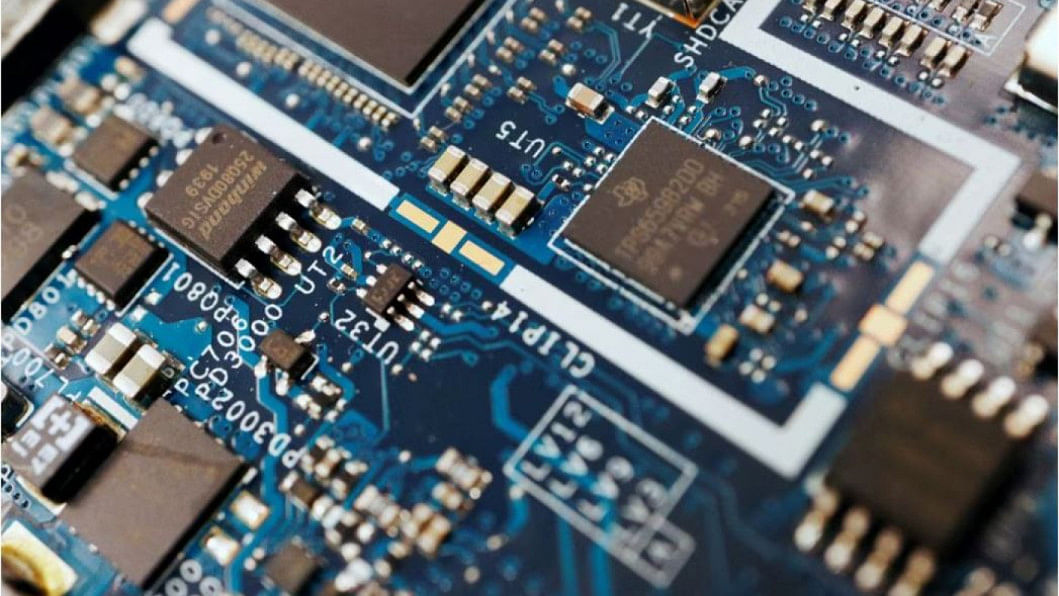Taskforce unveils roadmap for semiconductor growth

The national semiconductor taskforce has charted a roadmap to unlock the country's potential in semiconductors, focusing on three priority areas — skills development, business environment and policy support, and global linkages.
As per the roadmap, the plan includes training programmes, virtual certification portals, and high-tech labs to build a skilled workforce in chip design and testing.
Ashik Chowdhury, executive chairman of the Bangladesh Investment Development Authority (Bida) and the Bangladesh Economic Zones Authority, shared the vision at a press conference held yesterday at the Foreign Service Academy.
He said the taskforce has recommended fiscal incentives, streamlined customs processes, and dedicated zones in high-tech parks to attract investors and startups.
"Globally, Bangladesh aims to forge partnerships, pursue joint ventures, and leverage its diaspora network to tap into talent, technology, and markets," he added.
He also said that with this roadmap, Bangladesh aspires to emerge as a major player in the global semiconductor ecosystem, transforming its economy and technological future.
However, he acknowledged that Bangladesh is not yet prepared for the massive investments required to establish semiconductor fabrication plants.
He highlighted significant opportunities in design services, chip testing, and packaging.
"Design and packaging offer us the fastest route to entry," the taskforce's report notes, citing local professionals who are already working with Silicon Valley firms and the country's large cohort of science and engineering graduates.
In the medium term, the taskforce proposes expanding advanced training, fostering research collaborations, and exploring prospects in semiconductor fabrication through global partnerships.
Countries like Malaysia, which currently face shortages of skilled chip designers, represent potential partners and markets for Bangladeshi talent, the report adds.
If realised, the taskforce expects that these recommendations will transform Bangladesh from a marginal player into a serious contender in the global semiconductor value chain.
"Bangladesh's advantage lies in its young, tech-savvy workforce eager to gain advanced skills," Bida chief Chowdhury said.
Stating that clear timelines have been proposed to ensure accountability, he said, "The ball is now in the court of the Chief Adviser's Office."
Chowdhury believes the sector could attract hundreds of millions — or even billions — of dollars in investment if Bangladesh can build an investor-friendly environment. "Systematic implementation and political continuity are crucial for success."
Taskforce member ABM Harun-Ur-Rashid, professor at Bangladesh University of Engineering and Technology (Buet), echoed the optimism.
"Our graduates from engineering universities are globally competitive. If we can create good opportunities here, they won't need to go abroad to work in places like Silicon Valley," he said.
Bangladesh, however, faces significant challenges in building a domestic semiconductor industry, he noted.
"Competing with established global semiconductor hubs will require strong international partnerships and rigorous adherence to quality standards," the Buet professor said.
Another taskforce member, Syed Mahfuzul Aziz, former pro-vice-chancellor of BRAC University, said Bangladesh aims to train 4,000–5,000 engineers annually by 2030 to bridge the semiconductor talent gap.
Short-term strategies include online learning, industry-led programmes, and university partnerships to accelerate skills in chip design, verification, and testing, he noted.
"This is a high-skill, high-paying sector. Our young population is our biggest asset, but we must ensure proper training and industry exposure," said Aziz.
He also revealed that Bangladesh is pursuing collaborations with semiconductor powerhouses like Taiwan, South Korea, Malaysia, and the US to integrate into global supply chains.
Long-term success, he stressed, will require policy stability and sustained commitment to secure Bangladesh's place in a market projected to exceed $1 trillion by 2030.
Mohammed Enayetur Rahman, founder, CEO, and president of ULKASEMI, underscored the importance of building cleanroom infrastructure, expediting import processes for specialised equipment, and ensuring government-backed financial support, such as soft loans or grants, to help local firms scale operations.
"We are ready to work closely with the government. If we get the right support, our current team of 500 engineers could quickly grow to 1,000," said Rahman, whose company is one of Bangladesh's leading semiconductor design firms.
Despite the optimism, Rahman acknowledged significant hurdles. Establishing a semiconductor fabrication plant can require investments upwards of $12 billion — a scale currently beyond Bangladesh's capacity, he said.
Instead, the country aims to consolidate its position in design services and the less capital-intensive segments of the value chain.

 For all latest news, follow The Daily Star's Google News channel.
For all latest news, follow The Daily Star's Google News channel. 



Comments